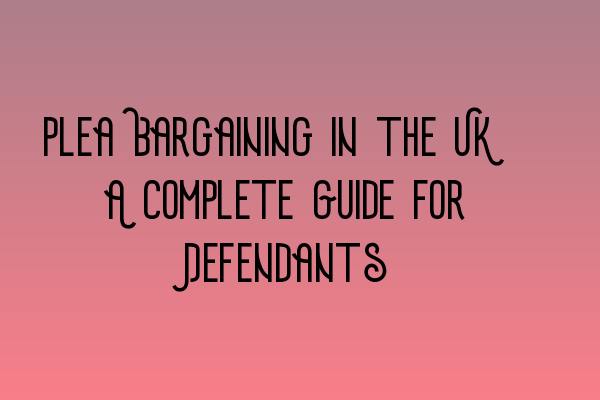Plea Bargaining in the UK: A Complete Guide for Defendants
As a defendant facing criminal charges in the UK, you may have heard of the term “plea bargaining.” But what exactly does it mean? And how does it work in the UK legal system? In this comprehensive guide, we will walk you through the ins and outs of plea bargaining, providing you with valuable insights and information to help you make informed decisions in your case.
What is Plea Bargaining?
Plea bargaining is a negotiation process between the defendant and the prosecution, where the defendant agrees to plead guilty to a lesser charge or to cooperate with the prosecution in exchange for a reduction in sentence. It is a common practice in many legal systems, including the UK, aimed at resolving cases efficiently and effectively.
The Benefits of Plea Bargaining
There are several advantages to considering plea bargaining as a defendant:
- Reduced Charges: By negotiating a plea deal, you may have the opportunity to plead guilty to a lesser offense, which could have less severe consequences.
- Lower Penalties: In exchange for your cooperation, the prosecution may recommend a more lenient sentence, potentially reducing the amount of time you spend in prison.
- Certainty: By reaching a plea agreement, you can avoid the uncertainty and risks associated with going to trial, where the outcome is uncertain.
It is important to note that plea bargaining is not always the right choice for every case. You should consult with your solicitor to assess the potential benefits and drawbacks based on the specific circumstances of your situation.
The Types of Plea Bargaining
There are different types of plea bargaining that can be pursued, depending on the nature of the case. These include:
- Charge Bargaining: In charge bargaining, the defendant agrees to plead guilty to a lesser charge in exchange for the dismissal of more serious charges.
- Sentence Bargaining: Sentence bargaining involves negotiating a recommended sentence with the prosecution, potentially resulting in a lighter penalty.
- Factual Basis Bargaining: Factual basis bargaining occurs when the defendant agrees to provide additional information or testimony to support the prosecution’s case in exchange for a reduced sentence or charge.
- Cooperation Agreement: A cooperation agreement is reached when the defendant agrees to fully cooperate with the prosecution, often by providing information or testimony against other individuals involved in criminal activities.
Each type of plea bargaining has its own set of implications and considerations. Your solicitor will guide you through the process and help you determine which approach is most suitable for your case.
The Role of Your Solicitor in Plea Bargaining
Your solicitor plays a crucial role in the plea bargaining process. They will:
- Assess the strength of the prosecution’s case against you.
- Negotiate with the prosecution on your behalf.
- Explain the potential consequences and benefits of accepting a plea bargain.
- Advise you on whether it is in your best interest to accept or reject the proposed plea deal.
Having a skilled and experienced solicitor by your side can greatly increase your chances of obtaining a favorable outcome through plea bargaining.
Conclusion
Plea bargaining can be a complex and sensitive process. Understanding the basics of plea bargaining and how it works in the UK legal system is essential for defendants seeking the best possible outcome for their case. By consulting with a knowledgeable solicitor and exploring the available options, you can make informed decisions to protect your rights and interests throughout the legal process.
For more information and resources on criminal law and practice, we recommend checking out the following related articles:
- Workshops and Seminars on Criminal Practice: Expanding Your Expertise
- Updates in UK Criminal Laws: Staying Informed and Prepared
- Enhancing Your SQE Criminal Law Study Group Experience
- Decoding Criminal Evidence Rules: A Detailed Analysis
- Ensuring Rights of Victims in Criminal Procedures: Legal Protections and Support
